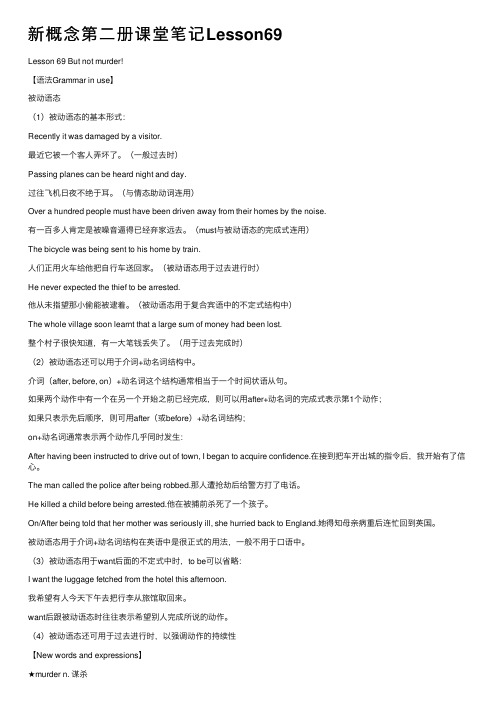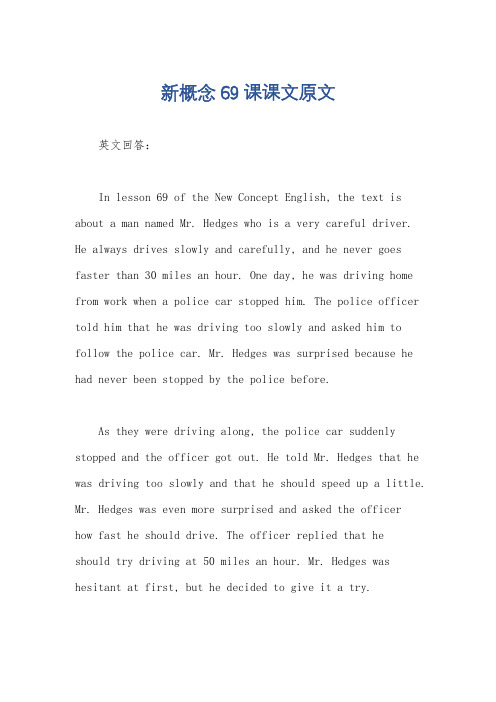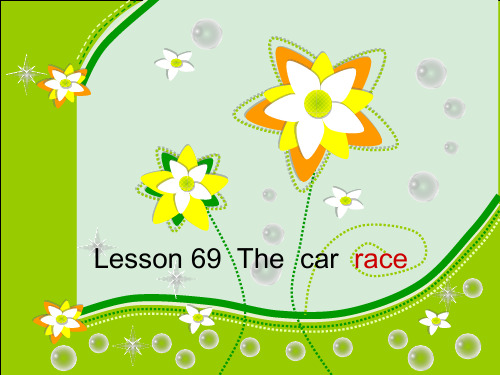69新概念英语第二册69课
新概念第二册课堂笔记Lesson69

新概念第⼆册课堂笔记Lesson69Lesson 69 But not murder!【语法Grammar in use】被动语态(1)被动语态的基本形式:Recently it was damaged by a visitor.最近它被⼀个客⼈弄坏了。
(⼀般过去时)Passing planes can be heard night and day.过往飞机⽇夜不绝于⽿。
(与情态助动词连⽤)Over a hundred people must have been driven away from their homes by the noise.有⼀百多⼈肯定是被噪⾳逼得已经弃家远去。
(must与被动语态的完成式连⽤)The bicycle was being sent to his home by train.⼈们正⽤⽕车给他把⾃⾏车送回家。
(被动语态⽤于过去进⾏时)He never expected the thief to be arrested.他从未指望那⼩偷能被逮着。
(被动语态⽤于复合宾语中的不定式结构中)The whole village soon learnt that a large sum of money had been lost.整个村⼦很快知道,有⼀⼤笔钱丢失了。
(⽤于过去完成时)(2)被动语态还可以⽤于介词+动名词结构中。
介词(after, before, on)+动名词这个结构通常相当于⼀个时间状语从句。
如果两个动作中有⼀个在另⼀个开始之前已经完成,则可以⽤after+动名词的完成式表⽰第1个动作;如果只表⽰先后顺序,则可⽤after(或before)+动名词结构;on+动名词通常表⽰两个动作⼏乎同时发⽣:After having been instructed to drive out of town, I began to acquire confidence.在接到把车开出城的指令后,我开始有了信⼼。
新概念69课课文原文

新概念69课课文原文英文回答:In lesson 69 of the New Concept English, the text is about a man named Mr. Hedges who is a very careful driver. He always drives slowly and carefully, and he never goes faster than 30 miles an hour. One day, he was driving home from work when a police car stopped him. The police officer told him that he was driving too slowly and asked him to follow the police car. Mr. Hedges was surprised because he had never been stopped by the police before.As they were driving along, the police car suddenly stopped and the officer got out. He told Mr. Hedges that he was driving too slowly and that he should speed up a little. Mr. Hedges was even more surprised and asked the officer how fast he should drive. The officer replied that heshould try driving at 50 miles an hour. Mr. Hedges was hesitant at first, but he decided to give it a try.After driving at 50 miles an hour for a while, Mr. Hedges felt more comfortable and realized that he had been driving too slowly all this time. He thanked the police officer for stopping him and giving him some advice. From that day on, Mr. Hedges became a more confident driver and was no longer afraid to drive faster when necessary.中文回答:在新概念英语第69课中,文章讲述了一个叫做赫奇斯先生的人,他是一个非常谨慎的司机。
新概念英语69课

• class+room—classroom 教室
• class+mate-classmate同学
• house+wife-housewife家庭主妇
• police+man-policeman警察
• bed+room-bedroom 卧室
21.06.2019
• How old 意为“多大年龄,几
岁”,是用来询问年龄的疑问词组。
其中old为形容词,指年龄。其句
型机构为“How old+be+主语”,
表示“……几岁\多大了”,答语
常用句型“主语+be+基数词
+years old\months”.也可以直接
说年龄。
21.06.2019
8
• How old is Bob? • 同义句:What’s Bob’s age?
• 与day的区别: • day • 1.意为“天”,指24小时,一整天。What day is it
today? • 2.指“特定的重大的日子、节日”,It is Children’s Day. • 3.意为“白昼”,与night相对。day and night白天和夜
晚。
21.06.2019
7
How old are you,Alice?
• 1.when疑问副词,意为“什么时候”,引导特殊疑 问句,其结构为“when+一般疑问句?”。When可 以对年、月、日以及时刻进行提问或者询问某一动 作发生的时间。
• eg:When do you go to school ?
• When are you at home? • 2.birthday是由名词birth“出生”和名词day“日子”
新概念英语第二册Lesson 69 (共63张PPT)

New words and expressions
• They managed to put on the brakes just
___in__t_im__e.
New words and expressions
• Living with a conscience is like driving a car with the brakes on.
It’s not certain how the fire started but it might _h__a_ve__b_e_e_n__ca_u_s_e_d_ by an electrical fault.
•TEXT
Text
• I was being tested for a driving license for the third time.
•
-- Budd Schulberg
•GRAMMAR
Grammar 被动语态
• 复习:
时态 一般现在时
主动语态 do/does
被动语态 am/is/are done
一般过去时
did
was/were done
Grammar
• 复习:
时态 现在完成时
过去完成时
主动语态
被动语态
have/has done have/has been done
Text
• Sure that I had passed, I was almost beginning to enjoy my test.
Text
• enjoy, entertain and amuse:
• I was almost beginning to enjoy my test. • He entertained me to dinner. • The children were amused by the circus
新概念英语第二册 Lesson 69

adj. instructive 有益的;教育性的 instructional 教学的;指导的,教育的
adv. instructively 有益地;教育地 n. instruction 指令,命令;指示;教导;用法说明 instructor 指导书;教员;指导者 instructress 女教师;女指导
suppose
vt. 1. 假使,假定 Supposing he isn't out, how can I do then? 假定他没出去,我该怎么办呢? Let's first suppose the second defense line has been destroyed. 我们先来假定这第二条防线已被摧毁。 2. [用于祈使句]让 Suppose we wait until tomorrow. 咱们就等到明天吧。 Suppose I tell you.我来告诉你吧。 3. 猜想,推测 I suppose he'll come back now. 我想他这会儿该回来了。 You can't suppose whom I met in the street. 你准猜不着我在大街上看见谁啦。 4. 认为,以为 What do you suppose I will do? 你认为我会做什么? 5. 意味着;说明(或证明)…的事实(或情况) The number of the cars supposes that the city traffic would get busier and busier. 这些汽车的数量意味着该市的交通会越来越拥挤。 That doesn't suppose you were absent at the scene of the crime. 那并不能说明你不在犯罪现场。 6. 假定…的存在;需要…的存在为先决条件 First, we have to suppose that she was out to make money. 首先,我们得假定她抛头露面是为了赚钱。
新概念二第69课作文答案

新概念二第69课作文答案英文回答:In Lesson 69 of New Concept English, the topic is about the importance of learning a foreign language. Learning a foreign language has become increasingly important intoday's globalized world. Firstly, it allows us to communicate with people from different countries and cultures. For example, if I am able to speak Mandarin Chinese, I can easily communicate with Chinese people when I travel to China or when I meet Chinese people in my own country. This opens up opportunities for cultural exchange, business partnerships, and friendships. Secondly, learning a foreign language can enhance our cognitive abilities. Studies have shown that bilingual individuals have better problem-solving skills, improved memory, and increased creativity. This is because learning a new language requires us to think in different ways and adapt to different linguistic structures. Finally, learning a foreign language can also boost our career prospects. Intoday's global job market, employers often value candidates who can speak multiple languages. Being bilingual or multilingual can give us a competitive edge and increase our chances of getting hired for international positions or assignments.中文回答:在《新概念英语》第69课中,讨论了学习外语的重要性。
新概念英语第二册69课练习题教学文稿
新概念英语第二册69课练习题被动语态练习题1. It is said that a new robot ____by him in a few days.A. designedB. has been designedC. will be designedD. will have been designed2. She will stop showing off if no notice____ of her.A. is takenB. takesC. will be takenD. has taken3. My pictures ____until next Friday.A. won't developB. aren't developedC. don't developD. won' t be developed4. Tim ____since he lost his job three weeks ago.A. had been unemployedB. was unemployedC. has been unemployedD. has unemployed5. A great number of colleges and universities ____since 1949.A. has been establishB. have been establishedC. have establishedD. had been established6. I'll have to push the car to the side of the road because we ____if we leave it here.A. would be finedB. will be finedC. will being finedD. will have been fined7.“____two tickets for the new play at the Grand Theatre on Saturday. Shall we go and see it together?”A. They have been givenB. I have been givenC. I am givenD. They have given to me8. The goods ____when we arrived at the airport.A. were just unloadingB. were just been unloadingC. had just unloadedD. were just being unloaded9. I think much attention ____your pronunciation.A. must be paid toB. ought to be paid toC. must pay toD. should be paid to10. I don't remember ____the chance to try this method.A. having been givenB. to have been givenC. having givenD. to have given11.We could ask someone to do the work privately without it____.A. knowB. be knownC. being knownD. to be known12. The construction of the laboratory ____by the end of next month.A. must be completedB. must have been completedC. will be completingD. will have been completing13. He does not possess a bicycle, this one he uses ____to Peter.A. is belonged toB. belongedC. belongsD. is belonging14. The reason for all the changes being made ____to us yet.A. has not explainedB. has not been explainedC. did not explainedD. were not explained15. When he turned the corner, he found himself ____by a man in black.A. tailedB. been tailedC. was tailedD. had been tailed16. A candidate for the democratic presidential nomination ____at this moment.A. is interviewingB. being interviewedC. is being interviewedD. interviewing17. As we approached the work site, the workers were seen ____the new house.A. buildingB. buildC. builtD. to build18. He ordered that the books _______at once.A . would be printedB . would printC . be printedD . print19. He _______by his teacher.A. happened to seeB. was happened to seeC. happened to be seenD.was happened to be seen20. If city noises ____ from increasing,people ____ shout to be heard even at dinner.A. are not kept; will have toB. are not kept;haveC. do not keep;will have to D . do not keep;have to21. This page needed ___ again.A .being checkedB .checkedC . to check D. to be checked。
新概念英语课件第69课
介词的用法
At:具体地点 at school at home
具体时间 at the weekend at 6 o’clock On:具体哪一天
on Monday on 1st August In:Байду номын сангаас糊时间与地点
in July in China
Exercises
用 at on in 完成句子
summary
一般现在时与一般过去时的用法 二者之间的转换 In on at介词的用法
一般过去时的应用
动词的过去式:在表示过去发生的事情时,句子中
的动词需要用过去式。
动词过去式的变化规则:
1.v+ed
clean-cleaned
2.以e结尾+d move-moved
3.不规则动词:
Here were some butterflies yesterday.
Lesson 70
When were they there?
stationer[`steiʃənə]
stationer’s 文具店
at the stationer’s
在文具店里
Denmark[`denmɑ:k]
Danish[`deiniʃ] 丹麦人 Where are you from ? I am from Denmark. What nationnality are you ? I am Danish.
everyday,but yesterday she forgot to do it.
There were hundreds of people there . My wife and I were at the race . Our friends Julie and Jack were there , too.
新概念二第69课作文答案
新概念二第69课作文答案英文回答:In lesson 69 of New Concept English Book 2, the topic of the essay is about the importance of time management. Time management is a crucial skill that everyone should possess in order to be successful in both personal and professional life.One example of the importance of time management is when I was in college. I used to procrastinate a lot and leave things until the last minute. This resulted in me being stressed out and not performing at my best. However, after realizing the importance of time management, I started planning my tasks and allocating time for each of them. This helped me to be more organized and efficient in completing my assignments and studying for exams.Another example is in the workplace. If you don't manage your time effectively, you may end up missingdeadlines, which can have negative consequences on your career. By prioritizing tasks and setting deadlines foreach of them, you can ensure that you are meeting yourgoals and delivering quality work on time.Overall, time management is a skill that can greatly impact your success and well-being. It allows you to makethe most out of your day and achieve your goals efficiently.中文回答:在新概念英语第二册第69课中,文章的主题是关于时间管理的重要性。
新概念英语第二册课文全篇及翻译96篇
新概念英语第二册课文全篇及翻译96篇1. Lesson 1: A private conversation - 一场私人对话2. Lesson 2: Shopping - 购物3. Lesson 3: A charity appeal - 慈善募款4. Lesson 4: For here or to go? - 在这儿用还是带走?5. Lesson 5: The best and the worst - 最好和最差的6. Lesson 6: Flying saucers - 飞碟7. Lesson 7: A skeleton in the cupboard - 抽屉里的骷髅8. Lesson 8: A famous monastery - 一座有名的修道院9. Lesson 9: Olympic Games - 奥林匹克运动会10. Lesson 10: The perfect crime - 完美的犯罪11. Lesson 11: The importance of money - 金钱的重要性12. Lesson 12: Robots at work - 机器人在工作中13. Lesson 13: Food for thought - 发人深省的事14. Lesson 14: The end of the world? - 世界末日?15. Lesson 15: Lost property - 失物招领处16. Lesson 16: A polite request - 一个礼貌的请求17. Lesson 17: A trip to Australia - 澳大利亚之旅18. Lesson 18: Banks and shopping - 银行与购物19. Lesson 19: There's no smoke without fire - 无风不起浪20. Lesson 20: Long distance love - 远距离恋爱21. Lesson 21: A new house - 一所新房子22. Lesson 22: Nothing is impossible - 没有什么是不可能的23. Lesson 23: The Women's Institute - 妇女协会24. Lesson 24: The way to be happy - 幸福之道25. Lesson 25: China's treasures - 中国的宝藏26. Lesson 26: America's National Parks - 美国的国家公园27. Lesson 27: The benefits of laughter - 笑的好处28. Lesson 28: Travel - 旅行29. Lesson 29: Growing plants indoors - 室内种植植物30. Lesson 30: Tom's hobby - 汤姆的爱好31. Lesson 31: The invention of penicillin - 青霉素的发明32. Lesson 32: The Loch Ness Monster - 尼斯湖水怪33. Lesson 33: How to stop smoking - 如何戒烟34. Lesson 34: The Channel Tunnel - 海峡隧道35. Lesson 35: Memories - 回忆36. Lesson 36: The history of the Olympics - 奥运会的历史37. Lesson 37: Chance and opportunity - 机会与机遇38. Lesson 38: An unusual school - 一所不寻常的学校39. Lesson 39: Telepathy - 心灵感应40. Lesson 40: Motoring - 汽车运动41. Lesson 41: The Bank of English - 英语银行42. Lesson 42: Thw wind of change - 变革的风43. Lesson 43: My dream - 我的梦想44. Lesson 44: Secrets of the mind - 心灵的秘密45. Lesson 45: The Wadden Sea - 瓦登海46. Lesson 46: A trip into space - 太空之旅47. Lesson 47: Going into hospital - 进医院48. Lesson 48: Daredevils - 蛮勇的人49. Lesson 49: A new breed of car - 新一代的汽车50. Lesson 50: Arabian hospitality - 阿拉伯的好客51. Lesson 51: Peaceful uses of atomic energy - 和平利用原子能52. Lesson 52: A birthday present - 一份生日礼物53. Lesson 53: The coast of East Anglia - 东安格利亚海岸54. Lesson 54: Looking for a job - 找工作55. Lesson 55: Studying abroad - 出国留学56. Lesson 56: Poles apart - 截然不同57. Lesson 57: The story of silk - 丝的故事59. Lesson 59: Art and artists - 艺术和艺术家60. Lesson 60: Keeping the doctor away - 远离医生61. Lesson 61: The European Parliament - 欧洲议会62. Lesson 62: The early days of aviation - 航空的早期日子63. Lesson 63: Sleep and health - 睡眠与健康64. Lesson 64: Beyond the Milky Way - 银河系之外65. Lesson 65: Settling down - 定居下来66. Lesson 66: Astronomical discoveries - 天文学的发现67. Lesson 67: Curiosity - 好奇心68. Lesson 68: Making an emergency landing - 进行紧急降落69. Lesson 69: Power for the future - 未来的动力70. Lesson 70: The Bald Piano Player - 秃头钢琴家71. Lesson 71: A difficult customer - 一个难对付的顾客72. Lesson 72: The Olympic Games - 奥林匹克运动会73. Lesson 73: The world's worst singer - 世界上最糟糕的歌手74. Lesson 74: Just a holiday - 只是一次假期75. Lesson 75: Home sweet home - 甜蜜的家76. Lesson 76: A famous clock - 一个著名的时钟77. Lesson 77: False money - 假币78. Lesson 78: The United Nations - 联合国79. Lesson 79: Changing attitudes - 态度的转变80. Lesson 80: Cultural exchanges - 文化交流82. Lesson 82: Television and radio - 电视和广播83. Lesson 83: Marriage - 婚姻85. Lesson 85: Danger - men at work - 危险 - 男人在工作86. Lesson 86: Saving electricity - 节约用电87. Lesson 87: A close shave - 惊险时刻88. Lesson 88: Music - the universal language - 音乐 - 普遍的语言89. Lesson 89: Space pioneers - 太空先驱者90. Lesson 90: House-warming - 乔迁之喜91. Lesson 91: Toys - 玩具92. Lesson 92: Dear George - 亲爱的乔治93. Lesson 93: Growing old - 变老94. Lesson 94: What's in a name? - 名字有什么重要?95. Lesson 95: The dance of the hens - 鸡的舞蹈96. Lesson 96: A pretty carpet - 一块漂亮的地毯。
- 1、下载文档前请自行甄别文档内容的完整性,平台不提供额外的编辑、内容补充、找答案等附加服务。
- 2、"仅部分预览"的文档,不可在线预览部分如存在完整性等问题,可反馈申请退款(可完整预览的文档不适用该条件!)。
- 3、如文档侵犯您的权益,请联系客服反馈,我们会尽快为您处理(人工客服工作时间:9:00-18:30)。
• As soon as I tap on the window, you must stop within five feet.' I continued driving and after some time, the examiner tapped loudly, Though the sound could be heard clearly, it took me a long time to react. I suddenly pressed the brake pedal and we were both thrown forward. The examiner looked at me sadly. 'Mr. Eames,' he said, in a mournful voice, 'you have just killed that child!'
• • • • • • • •
★suppose 1). 假设 假设你是总经理,在那种情况下你会怎么做 Suppose that you’re the general manager, what will you do on that occasion. 2). 认为 think, expect be supposed to 理应,应该 他应该准时在那 He is supposed to be there on time
★react 1). react to sb./sth 当地居民对这一消息表示愤怒 Local residents have reacted angrily to the news. 我花了很长时间才反应过来 It took me a long time to react. The market reacted by falling a further two points. 股市的反应是再下跌两个百分点 2). 化学反应 reactant 化学反应物 nuclear reactor 核反应堆
• • • • • • • • • •
★mournful adj. 悲恸的, 令人惋惜的, 悲哀的 There was a mournful look on her face. He said in a mournful voice. mourn v. 感到悲痛 mourn for/over sb./sth. 人民哀悼他们被杀害的领袖 The people mourned for their slain leader. 她为她独生子的死而哀痛 She mourned over the death of her only son. mourner 哀悼者
• I was being tested for a driving licence for the third time. • driver’s licence 驾照 • practice licence 营业执照 • licence plate (美)车牌 number plate(英)车牌 • test • 1)v. 测验,检查 • 我最好是检查一下眼睛 • I’d better have my eyes tested. • 2)n. 考试,试验,检查, • Their affection has stood the test of time. • have a test drive 试车 • test match国际锦标赛
• • • • • • • • • • • •
★confidence n. have/lose confidence in sb./ sth. 他充满信心地回答问题 He answered the questions with confidence I have every confidence that I can manage it be full of confidence 充满信心 confident adj. 有信心的, 有把握的 confident of sth. confident that 我肯定你能得到那份工作 I’m confident that you’ll get the job. 他确信会达到目标 He was confident of achieving his aim.
.
• • • • • •
★examine v. 1). 调查,检查,研讨 我们的行李在机场进行了安检 We had our suitcases examined at the airport. 2). 测验 I examined the students in English on the previous lessons. • 3). 诊察(看病) • examiner 主考人 • examinee被考人
• • • • •
★brake 1). n. 刹车 put on the brakes 踩刹车 2). v. . The driver braked hard as the dog ran onto the road. • She had to brake hard to avoid running into the car in front. • 她不得不猛踩刹车,以免撞上前面的车。
• • • • • • • • • • •
★murder 1). n. be guilty of murder 犯谋杀罪 murder will out 纸包不住火 homicide [‘hɔmisaid] 杀人(犯) manslaughter ['mæ nslɔtə(r)]过失杀人 massacre [‘mæ səkə] 大屠杀 assassinate [ə‘sæsineit] 暗杀 poison 毒杀 suffocate [‘sʌfəkeit]窒息而死 hang 绞死 2). v. murderer murderess
• • • • • • • •
★pedal 1). n. 踏板 a brake pedal 刹车踏板 She pressed her foot down sharply on the brake pedal. 她猛踩刹车踏板。 2). v. 踩踏板,骑 pedal a bicycle 骑自行车 A boy pedaled away on his bicycle.
But not murder
• I was being tested for a driving licence for the third time. I had been asked to drive in heavy traffic and had done so successfully. After having been instructed to drive out of town, I began to acquire confidence. Sure that I had passed, I was almost beginning to enjoy my test. The examiner must have been pleased with my performance, for he smiled and said, 'Just one more thing, Mr. Eames. Let us suppose that a child suddenly crosses the road in front of you.
• • • • • • • •
★acquire 1). (靠努力或行为)获得 gain 获得自信 acquire confidence 2). 学得,养成(习惯) 养成抽烟的习惯 acquire a habit of smoking acquisition [æ kwi'ziʃən • • • • • •
drive 1)v. Can you drive me home/to the station? The death of her son drove her mad. Failure drove him to suicide. 2)n. 路程,车程 到车站只有几分钟车程。 It’s only a few minutes’ drive to the station.
• After having been instructed to drive out of town, I began to acquire confidence. • Sure that I had passed, I was almost beginning to enjoy my test. The examiner must have been pleased with my performance, for he smiled and said, • must have been表示对过去的事情的猜测 • be pleased with 对……满意 • 他对我的进步很满意 • He was pleased with my progress. • 她似乎很满意他来了。 • She seemed very pleased that he had come • performance n. 表现,表演,履行实行 • 他在工作上表现出色 • He is excellent in the performance of his duties.
Lesson 69 But not murder
New words and expressions
• • • • • • • • • • • murder ['mə:də] instruct [in'strʌkt] acquire [ə'kwaiə] confidence ['kɔnfidəns] examiner [ig'zæ minə] suppose [sə'pəuz] tap [tæ p] react [ri'æ kt] brake [breik] pedal ['pedl] mournful ['mɔ:nfəl] n. 谋杀 v. 命令,指示 v. 取得,获得 n. 信心 n. 主考人 v. 假设 v. 轻敲 v. 反应 n. 刹车 n. 踏板 adj. 悲哀的
